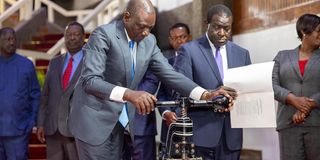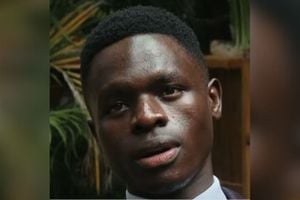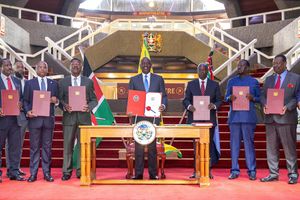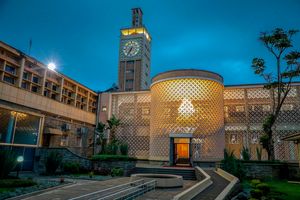
President Ruto puts the public seal on a copy of the new IEBC law at KICC in Nairobi on July 9, 2024. He has called for national talks.
President William Ruto on Tuesday appended his signature to the Independent Electoral and Boundaries Commission (Amendment) Bill, 2024, effectively making it law and setting stage for the reconstitution of the polls agency that has been operating without commissioners.
The signing into law of the Bill, which the first among the nine proposed legislations that emanated from the recommendations of the National Dialogue Committee (Nadco) report, paves way for the appointment of the sectional panel that will be tasked with recruiting new commissioners.
The timelines on the constitution of the selection panel will, however, only kick off after the new Bill has been gazetted and becomes law, which should happen within seven days.
This means that, if all factors are held constant, the country will have a new fully constituted IEBC team in place by October 28 or November 4, 2024.
President Ruto has faced mounting pressure to sign the Bill into law, particularly after Kenyans rejected the Finance Bill, 2024 and vowed to recall legislators who voted for it.
The various nominating bodies that will constitute the selection panel are now expected to forward names to the President, through the Parliamentary Service Commission, within 14 days.
Upon receipt of the names, President Ruto will appoint the panel within seven days. The panel will have 90 days to conclude the process of recruiting the chairperson and other members of the Independent Electoral and Boundaries Commission (IEBC).
Unlike the previous panel, which had seven members, the new team will comprise nine people.
According to the new structure, the nine members of the panel will include two persons nominated by the Parliamentary Service Commission, representing the majority/minority parties or coalitions of parties and three persons nominated by the Political Parties Liaison Committee.
The Law Society of Kenya and the Institute of Certified Public Accountants of Kenya will each have one slot while the Inter-Religious Council of Kenya will have two slots.
According to the Bill, members of the new-look IEBC will be required to have proven knowledge and at least 10 years’ experience to be eligible for appointment as commissioners.
The Bill also amended Section 6 of the Act, which will now require new members of the commission to have proven experience in accounting or information and communication technology as additional professional qualifications.
“The proposed additional experience in information and communication technology and accounting accords with the various functions of the commission that includes the use of technology and the prudent procurement of goods and services related to the conduct of elections,” reads the committee report that was adopted by the House.
In the new Bill, MPs also increased the period within which the IEBC is expected to review the conduct of general elections and table a report in the National Assembly from the current 12 months to 18 months.
The signing of the Bill into law has also officially ended the tenure of the Nelson Makanda-led team, which had already started spearheading the process of recruiting new commissioners.
“The panel existing immediately of this Act ceases to exist but a person who served as a member of that selection panel may be nominated to serve as a member of the selection panel appointed under this Act,” reads the Bill.
The means that the current panellists are eligible to re-apply for their positions once vacancy advertisements have been declared.
The team had proposed to MPs that all the work it has done so far, including the bio-data and credentials of the applicants it had processed, to be preserved as a record of the work it did.
Unlike previously when the funding of the panel was not clear, this time the Bill stipulates that the Parliamentary Service Commission will finance the panel’s operations, ensuring sufficient resources for thorough and impartial selection processes.
Opposition leader Raila Odinga on Tuesday said that, if the country is able to get the issue of the IEBC selection panel right, then most of the issues bedevilling it will have been resolved.
“It’s not the first time we have an issue with the IEBC. If we find a solution with this IEBC, we will be on our way to resolving many other underlying issues in our country,” Mr Odinga said during the signing the of the Bill at the Kenyatta International Convention Centre (KICC) in Nairobi.
The former Prime Minister lamented that the previous IEBC had brought shame to the country when they became divided over who had won the 2022 presidential election.
“In the last election, the whole world was stunned when they saw an electoral commission that was completely divided, some saying one thing and the other saying another thing. You may be happy that the other group ruled in your favour but what example are we showing to the world? It’s a shame to our country,” Mr Odinga said.
“We are sure that there are men and women in this country who can do a better job and that will help to unify this country,” he added. Mr Odinga pointed out that, should the Nadco report be implemented fully, the government will assuage youthful protesters whose backlash it has been facing.
“The Nadco report contains very many issues that are also being raised by the youth,” he said.
National Assembly Majority leader Kimani Ichung’wah, who co-chaired the Nadco team alongside Wiper Leader Kalonzo Musyoka, said the move marks an important step in the country’s journey towards the reconstitution of the IEBC.
“Let me assure the country that all the other eight Bills that emanated from the Nadco report are being processed in both Houses and we shall give them top priority,” Mr Ichung’wah said. “These Bills have emanated from a process in which we all came together as a country to dialogue.”
Mr Musyoka pointed out that there is no way the issues raised by the young people can be wished away in the wave of the anti-government protests.
“If we are to be honest with ourselves, perhaps we need to go back to Bomas [the Bomas of Kenya in Nairobi where the talks were held] because a lot of Kenyans wanted us to open this space that has now been opened by the Gen Z,” Mr Musyoka said.
According to Mr Musyoka, there was need to fast-track the remaining Nadco Bills.
“I wished we moved with speed, it has taken inordinate delay to get the first product of Nadco. I'm not sure if the others need to be fast tracked, they have to be juxtaposed with reality,” Mr Musyoka said.
The former vice-president added that President Ruto and Mr Odinga will have to consult and agree on who becomes the next chairperson of IEBC
“We made it very clear that you (President) and the former Prime Minister will have to agree on who becomes the chairperson of the new IEBC,” Mr Musyoka said.
Once the new IEBC team is fully constituted, one of its first orders of business will be to arrange for the by-election in Banisa constituency, Mandera County, as well as two wards in Western region where the voters have gone for months without an MP and MCA respectively.
Operations at the IEBC have been adversely affected following the retirement of former chairman Wafula Chebukati and commissioners Boya Molu and Abdi Guliye in January 2023.
Three other commissioners — Juliana Cherera (vice-chairperson), Francis Wanderi, and Justus Nyang’aya — resigned while Irene Masit was kicked out of office by a tribunal.
With the first Nadco Bill now out of the way of parliament, the focus now shifts to the remaining eight Bills that also emanated from the dialogue, including the Elections (Amendment) Bill, 2023, Elections Offenses (Amendment), Bill, 2023 and the Ethics and Anti-Corruption Commission (Amendment) Bill, 2023.
Others are the Statutory Instruments (Amendments) Bill, 2023, Political Parties (Amendment) Bill, 2023 and the National Government Coordination (Amendment) Bill, 2023.
The National Assembly has already set in motion the consideration of the Ethics and Anti-Corruption Commission (Amendment) Bill, 2024.
The Bill that was co-sponsored by Mr Ichung’wah and his minority counterpart Opiyo Wandayi seeks to give effect to some of the recommendations of the Nadco report that captured the attention of the public during its sittings.
Some of the recommendations that the Bill seeks to breathe life into include issues of electoral justice and related matters, outstanding constitutional matters, fidelity to political parties, coalitions and the law on multi-party democracy, and the entrenchment of National Government Constituency Development Fund into law
Other areas that the Bill seeks to address include the setting up of the Senate Oversight Fund and the National Government Affirmative Action Fund and establishment and entrenchment of State offices.
Members of the public have until July 18 at 5pm to submit their views on the Bill before its consideration by the House.








